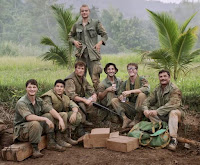Well into the 1950s, the northern Manhattan neighborhood of Inwood was considered the most rural area in the borough. Technically, it could still be. Traditionally, it was also predominantly Irish Catholic. Not surprisingly, the locals took exception to antiwar protesters who casually smeared the troops as “baby killers.” Out of that shared frustration, Chickie Donohue, a peace-time veteran and Merchant Marine, hatched a scheme to deliver beer to his neighborhood friends serving in-country. Much to everyone’s surprise, especially the soldiers in combat, Donohue followed-through. His real-life adventure is now the subject of Peter Farrelly’s The Greatest Beer Run Ever, which premieres today on Apple TV+.
Donohue still lives at home, because he and his mother think it would be a waste to pay rent while he is gone for months at a time with the Merchant Marine (who also have a crucial role to play during times of war). However, that means there are plenty of opportunities for arguments with his anti-war activist sister. During a gripe-session with the “Colonel,” the bartender at their local watering hole, Donohue latches on to a crazy idea to deliver beers to the troops in Vietnam, as a way to express their appreciation. However, it was not a totally unrealistic idea for Donohue, because there happened to be a supply ship leaving for Saigon that still had a vacancy.
With a duffle bag full of Pabst and a list of names and general locations, Donohue sets off, naively heedless of the chaos and danger he would be stepping into. For the sake of dramatic cohesion, Farrelly and co-screenwriters Brian Hayes Currie and Pete Jones compressed Donohue’s months-long mission into a 72-hour pass—over the final days of January, 1968, thereby raising the dramatic stakes, as those who know their history will immediately understand.
Clearly, Farrelly is going for a Good Morning Vietnam vibe, but Greatest Beer Run proves that is easier said than done. It so obvious Farrelly and his co-writers feel duty-bound to criticize the war, without attacking the troops in the way so many New Left protesters did. As a result, the film twists itself into pretzels, not infrequently questioning the motives and integrity of the government and top military brass, while attempting to sympathize with the enlisted men. It almost reaches Jekyll-and-Hyde extremes.
Indeed, Coates, the war correspondent played by Russell Crowe is supposed to be one of the good guys, but his smug moral superiority is absolutely nauseating. Regardless, he cannot help comparing unfavorably with Donohue, whom Zac Efron portrays winning earnestness—and nebbishness, very much contrary to his image. This is definitely some of his best work.
The on-the-verge-of-cancelled Bill Murray hardly looks like his usually smart-alecky self as the Colonel, but he brings some nice humanizing subtleties to what could have easily been a patriotic caricature. Crowe plays Coates like he is the coolest guy in the room, but he fails, making him insufferable instead. However, Kristin Carey really helps the film find its soul in the small but pivotal role of Mrs. Minogue, the worried mother of Donohue’s enlisted friend, who is missing-in-action and feared dead.
The late 1960s period details are nicely crafted, but the film’s historical perspective is so-so. There is some lukewarm criticism of the antiwar movement’s rhetoric, but the media is completely exonerated. Yet, the Colonel has a valid question when he asks whether WWII would have ended the way it did if it had been covered in the same manner as Vietnam. Still, such an unlikely gesture is sufficiently good-hearted and crazy to carry the film. Recommended for Efron and the depiction of the soldiers and blue-collar Inwood characters, The Greatest Beer Run Ever starts streaming today (930) on Apple TV+.

